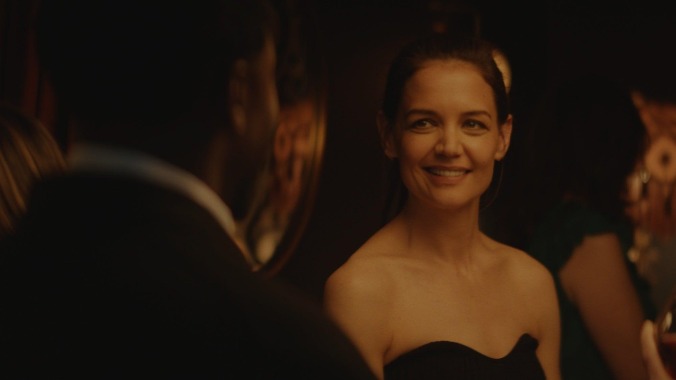In Alone Together, Katie Holmes tackles COVID-era relationships
The actress also writes and directs in this talky but thoughtful look at the early days of the pandemic

It’s a little surprising that more mumblecore-ish movies haven’t been made about the pandemic—especially since quarantine provides an extra layer of existential dread for young people who may already wrestle with interpersonal relationships. While we may soon tire of movies using the pandemic as a narrative catalyst (if we haven’t already), Katie Holmes’ Alone Together feels vitally of-the-moment at a time when so many films are ignoring the poignancy of that moment altogether. At the same time Holmes’ famous ex rakes in the dough with a movie where he plays a virtually flawless human being meeting larger-than-life challenges with ease, she goes in the polar opposite direction, depicting insecure, regular folks facing life’s most significant and universal current obstacle with relatable confusion.
Holmes wrote, directed, and stars in the film, marking the second time she’s tackled those last two roles together, following 2016’s All We Had. Aside from arguably making herself up a little too nicely in scenes where a person wouldn’t normally wear makeup it’s reasonably free from actorly vanity. Along with editor Sandra Adair (Boyhood), Holmes keeps the story moving smoothly and efficiently, a challenging task when the plot mostly consists of conversations that need to seem natural.
Holmes plays June, a food critic who, in the current media climate, is rapidly approaching an age where her job can’t fully sustain her any longer. As lockdown begins, she and her high-roller boyfriend John (Derek Luke) plan a weekend getaway to the sound of Bill de Blasio announcing doom and gloom on the radio. But two things quickly go wrong with their plans.
First, she arrives to find their AirBnB double booked, and a guy named Charlie (Jim Sturgess) already settled in. Next, John indicates that he can’t come because his parents need him. Fortunately, Charlie’s not an asshole—and in a scary, early pandemic world, “not an asshole” is just enough to qualify him as Mr. Right Now.
A little karaoke, a lot of wine, and some underwear sex ensues; Charlie’s stubble beard and cycling hobby basically makes him a Gen Z version of Peter Horton’s dream date from Singles. Plus he knows how to sew, and once the mask mandate comes along, he’s quick to refashion his grunge-era flannel shirts into face coverings. June, having imitated her boyfriend’s habits for too long, learns to try new things—like McDonald’s, the only restaurant nearby to remain open.
Holmes wrote the script at the beginning of the pandemic, and in contrast to so many major movies that don’t want to deal with the subject at all, its two-years-ago setting feels fresh, as does the rawness and insecurity. We laugh wryly when June wonders if lockdown will last “two weeks,” and eventually, we root for her to seize momentary joy with Charlie, even when it’s inevitable that John will complicate things with his arrival. There’s an uneasy moment in which the audience gets briefly put in the position of rooting against an interracial relationship, but for the better, the movie never dwells on or addresses that aspect of June and John’s dynamic.
John’s no villain, Charlie’s no hero, and June isn’t a perfect princess to be won or rescued. Each is a person trying to figure their life out, dealing with tragic realities like dead loved ones whose funerals can’t be safely held, while coming to turning points in their lives that occur regardless of the additional complexities that a pandemic adds. The characters’ ages aren’t stated, but the 43-year-old Holmes seems to be playing close to her own age, with all the attendant pressure women face then to settle down—if they’re going to. June avoids facing the specifics of that decision, but its expectations hang like an ambient threat to her current identity, transforming her frequently worn leopard-print jacket into a pointed visual metaphor for reluctance to change one’s spots.
Holmes’ DP, Martim Vian, gets some excellent B-roll, juxtaposing beautiful countryside shots with the conversations taking place inside the AirBnB. Vian also captures some great magic hour backlighting, further assisting an actress who’s been on screen long enough to know what angles and light sources are most flattering. Holmes makes it clear how much effort women go through to maintain their looks, while her male counterparts—especially Charlie—clearly do not at all. Exuding the perfect, glamorous level of unkemptness, the English Sturgess adopts a flawless American accent, perhaps in an effort not to make him any more irresistible than he already is.
Will she choose him over John? Does it matter? Would either relationship survive without a looming crisis containing them indoors? Viewers may take sides, but that’s not really the point of the story. Alone Together is all about the joys of the moment—a lost and then found “wine opener,” a spontaneous bike ride—at a time when it’s either foolish or naive to try and predict the ones that will follow. Then again, it’s also a reminder to treat your loved ones well, even—maybe especially—when a crisis might make you likelier to be impatient, insensitive, or discourteous. To actually communicate should be easier when you’ve got nowhere to go, and Holmes ensures that Alone Together succeeds at that—not just because the characters don’t know what lies in their future, but especially since the audience does.